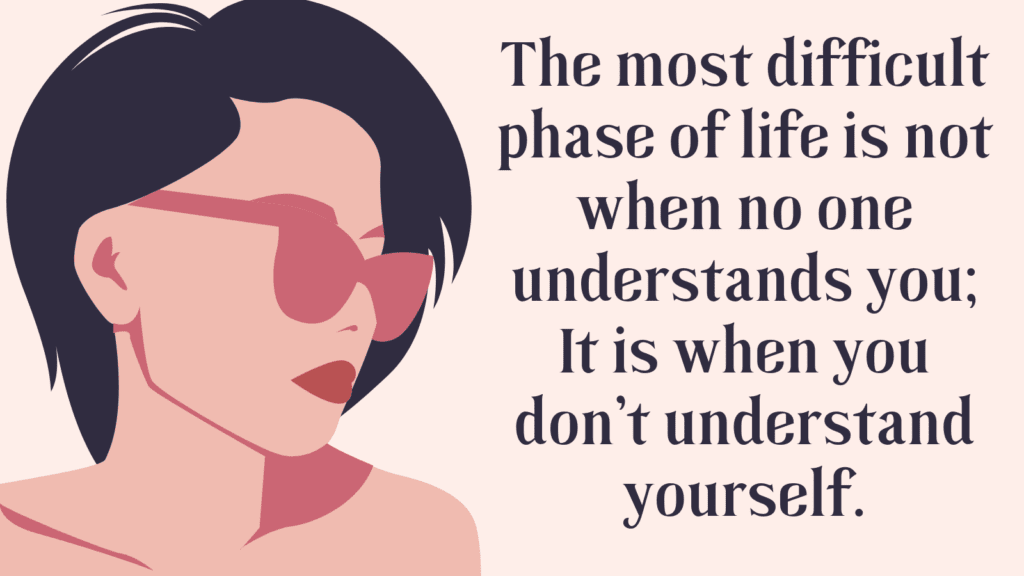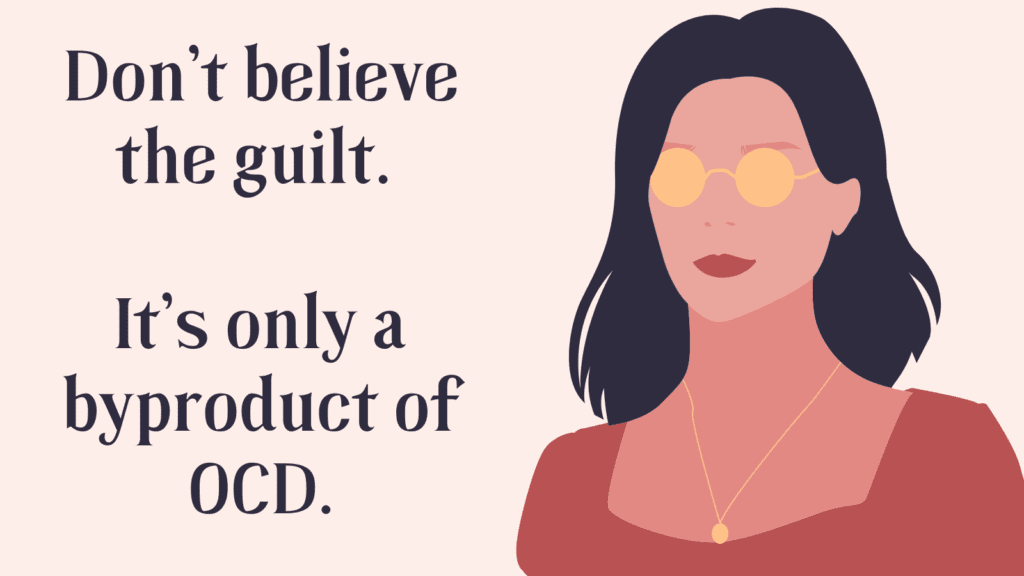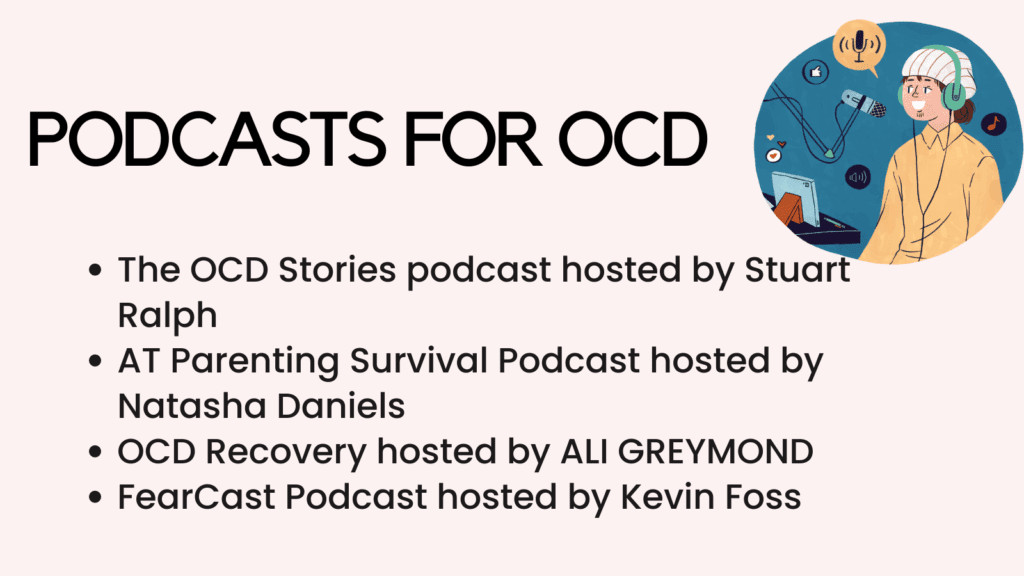Today, you’re going to learn how to support someone with OCD – what to avoid and what you can do that will help lessen their OCD.
When someone you care about is suffering from OCD, you’re likely to feel an impact from it and want to try to help your loved one feel better.
Unfortunately, despite your best intentions, you may find yourself maintaining the problem rather than helping lessen it.
Obsessive Compulsive Disorder (OCD) Symptoms
Obsessive Compulsive Disorder (OCD) is a psychological problem that causes repeated, unwanted thoughts or sensations (obsessions) or the sudden urge or feeling obliged to do something over and over again (compulsions).
Some individuals have both obsessions and compulsions.
In order to control or deal with their thoughts, those who suffer from OCD, have no choice but to perform repetitive acts and behaviors.
There are different types of obsessions and compulsions, the following are some examples:
1. Contamination obsession
The person gets easily worked up over getting in contact with germs or dirt. He believes they’ll make him get sick.
2. Checking compulsion
Checking is often carried out multiple times and might last for an hour or even longer. This includes checking things like door locks, windows, house alarm, stove knobs, water taps, emails and letters, illness and conditions, past memories, etc
3. Symmetry and order compulsion
The person has a need for symmetry in all things (pictures, clothes, books and CDs, neatness, spotless surfaces, etc). The individual arranges and organizes everything because of some irrational beliefs, such as “If this isn’t arranged by color, something bad will happen.”
4. Hoarding
The person is unable to discard useless or worn-out possessions. Although hoarding was reclassified in the 2013 publication of DSM-5 as a condition in its own right “hoarding disorder”, some people with OCD will hoard for very specific obsessive worries/fears, and should still be diagnosed as having OCD rather than “hoarding disorder”.
There are different types of symptoms when it comes to OCD:
1. Cognitive symptoms – include constantly thinking “I am responsible for everything,” or, “What if I’ll get sick because of this?”
2. Physical symptoms – include muscle tension, constant pain in the stomach, dizziness, headaches, and feeling detached from your own body.
3. Emotional symptoms – include anxiety, sadness, guilt, shame, and anger.
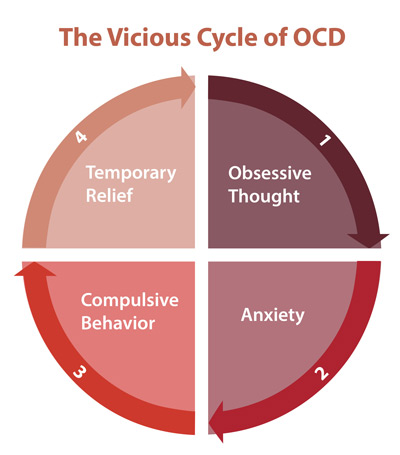
Related: OCD Recovery: How to Treat OCD Using Cognitive Behavioral Therapy (CBT)?
Challenges of Dating Someone with OCD
Dating someone with OCD can present some challenges, but with understanding and support, it is possible to build a healthy and fulfilling relationship.
Here are some common challenges you might face:
1. Reassurance seeking: People with OCD often seek reassurance repeatedly. This can be exhausting for their partner, who may feel like they need to constantly provide reassurance.
2. Rituals and routines: OCD often involves rituals and routines that must be followed. This can make planning activities or spending time together difficult.
3. Communication difficulties: It can be hard for someone with OCD to express their needs and feelings directly, which can lead to misunderstandings and confusion.
4. Anxiety: OCD can cause high levels of anxiety, which can result in mood swings and difficulty managing emotions.
5. Stigma: There is still some stigma surrounding mental health issues, including OCD. This can make it harder for your partner to feel understood and accepted.
Dating Someone With OCD: 7 Practical Ways You Can Help Someone With OCD
#1. Remember That They’re Not Their OCD
In treating OCD, individuals are encouraged to see their OCD as a bully that is trying to control them and control their lives.
This helps the person who is suffering from OCD to take a step back and see the OCD as something outside themselves, rather than part of who there are. This, in turn, helps them deal with it more effectively.
For the same reason, you need to also be able to see your loved one and his OCD as separate from each other.
Try This
When they are acting in ways that are out of character and seem totally unreasonable, remind yourself that this is the OCD bully overshadowing the person’s reasonable mind.
#2. Recognize That You Can’t Force Them to Change
Recognizing the problem and finding out how to fix it is only half the battle, the other half is how willing the person is to seek help.
Forcing your loved one when they’re resistant to change or seek help is a waste of time and effort, and sometimes money.
Avoid giving an ultimatum and instead, continue to provide gentle encouragement regarding seeking help.
Try This
You can also stop unintentionally supporting the OCD by refraining from accommodating the OCD’s demands.
This may make life difficult for the person with OCD in the short term but when you stop making things easier, the person is more likely to consider changing.
#3. Let Them Set the Pace
Avoid pushing your loved one and allow them to take the journey at their own pace.
Try This
To encourage your loved one, try asking the following questions:
- Can you think of something you can do that’s the opposite of what OCD wants you to do?
- Is there anything helpful we can do to help you redirect your attention away from OCD demands (such as going for a walk together)?
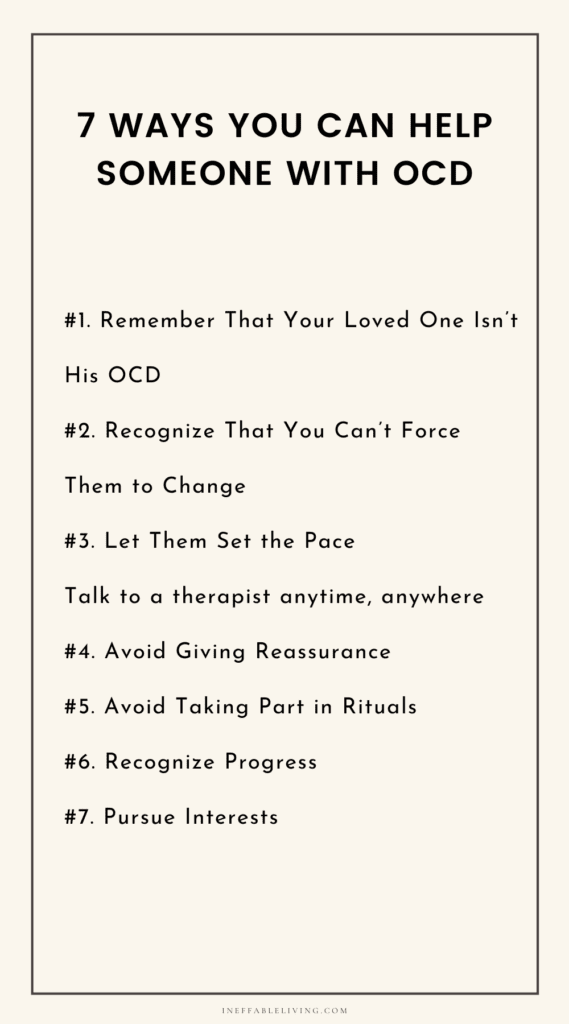
#4. Avoid Giving Reassurance
OCD is typically characterized by distress and doubt. Seeking reassurance is one unhelpful compulsion and coping mechanism the sufferer from OCD uses to alleviate their anxiety.
However, as you may know by now, giving reassurance doesn’t make the doubt go away for very long, simply because you can never be 100 percent certain.
Recovery is about learning how to deal with that doubt and uncertainty in healthier ways, by facing these feelings and allowing them to be.
You can help your loved one stop seeking reassurance by figuring out how to stop giving it.
Rather reassure them that you’re there for them and that you’ll help them get through this.
Be aware when you say things like It’ll be okay,’ or, ‘It’s fine,’ or, ‘Stop worrying.’
Sometimes seeking reassurance can be in the form of confession.
Your loved one might say to you, “I only read the questions one time, so I might have missed something.” You may find yourself automatically saying, “That’s okay.”
Try This
Explain to the person who is suffering from OCD that providing reassurance is unhelpful and therefore you’re no longer going to do it.
When the person asks for reassurance, remind them that they’re doing it and say something like “It’s just your OCD trying to control you. Don’t respond and it will pass.”
You can also give answers that leave plenty of room for doubt like ‘I’m not sure,’ or, ‘Maybe,’ or, ‘You’ll have to wait and see.’
Here are some strategies to consider:
- Silence. Literally don’t respond to the question.
- Walking out of the room.
- Giving the opposite of reassurance, like saying “Maybe.”
- Repeating the question back.
- Creating an impossible barter system, such as requiring fifty push- ups (or dollars) for each question.
#5. Avoid Taking Part in Rituals
Just like reassurance-seeking, rituals are a compulsive behavior that OCD sufferers engage in to help relieve anxiety.
You may find yourself taking part in these rituals thinking that it’s the easiest way to escape the discomfort.
Think of rituals as scratching an insect bite. It relieves the discomfort in the short term but, eventually, makes the bite worse and the spot will need more scratching.
Taking part in rituals includes:
- Allowing extra time for your loved one to complete a checking ritual
- Checking on behalf of your loved one, to save them the trouble
Learning to tolerate short-term discomfort is the only way to overcome OCD.
It might be painful for you to see your loved one in distress, but try to think of it with ‘short-term pain, long-term gain’ attitude.
Remind yourself that each time you take part in rituals, you’re colluding with the OCD and suggesting that the only way out is through giving in to the OCD’s demands.
Try This
If you’re already engaging in certain rituals, agree with your loved one to gradually stop engaging in these rituals and explain how these rituals aren’t worth the short-term relief and are making the problem worse in the long term.
If your loved one moves to other rituals, refuse to engage in them.
You might also negotiate a plan in which you move from step to step as each becomes better tolerated, such as:
- Checking the locks while they watch you.
- Checking only specifically identified “important” locks while they watch you.
- Checking the locks without them watching you.
- Not checking the locks, but leaving the house for only a short period of time.
- Not checking the locks, and leave for increasingly longer periods of time.
#6. Recognize Progress
Overcoming OCD takes time and effort. Without seeing improvement, the sufferer can easily get discouraged and give up.
Make sure you recognize the improvement and point them out to your loved one.
Improvement is measured by the intensity, frequency, and duration of obsessions, which aren’t visible to the onlooker.
It’s important to understand that progress can be slow, but also invisible.
#7. Pursue Interests
OCD loves a vacuum and it gets worse when your loved one doesn’t have enough interests to pursue and keep him busy.
Think about things you love doing and engage in those things more.
Also make sure you take time for yourself, too. Remind yourself that you can’t pour from an empty cup and that the better you feel, the more supportive you will be.
By embracing life and pursuing your own interest, you set a good model for your loved one with OCD.

Conclusion
Dating someone with OCD can present its own unique set of challenges.
OCD, or Obsessive Compulsive Disorder, is a mental health condition characterized by intrusive thoughts and repetitive behaviors.
These thoughts or obsessions can lead to compulsions or repetitive actions that the person with OCD feels compelled to perform in order to ease their anxiety.
If you are dating someone with OCD, it is important to be patient, supportive, and understanding.
Educating yourself on the condition can also help you better understand your partner’s experiences.
Encouraging them to seek professional help and offering to attend therapy sessions with them can also be helpful.
Ultimately, maintaining open communication and honest dialogue can help strengthen your relationship and overcome any challenges that arise.
References
- Portions of this article were adapted from the book Managing OCD with CBT For Dummies, © 2016 by Katie d’Ath and Rob Willson. All rights reserved.
- Portions of this article were adapted from the book When a Family Member Has OCD, © 2015 by Jon Hershfield. All rights reserved.
- How to Support A Friend With OCD (beyondocd.org)
- Helping someone who has OCD – Mind
- Obsessive compulsive disorder – family and friends – Better Health Channel
- How to Help Someone With OCD: 5 Effective Tips – Talkspace
- International OCD Foundation | Living With Someone Who Has OCD. Guidelines for Family Members (iocdf.org)
- 4 Ways to Help Someone with Obsessive Compulsive Disorder (wikihow.com)
